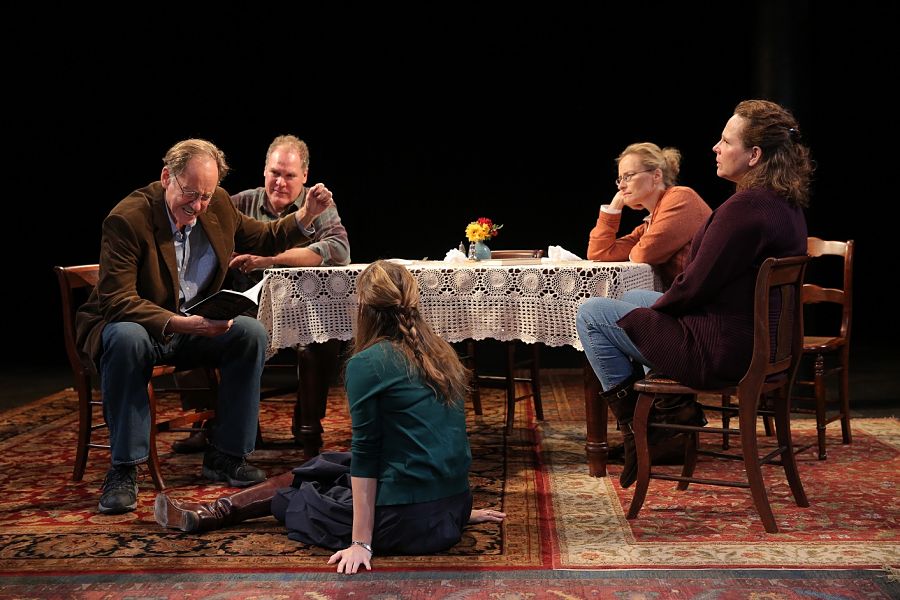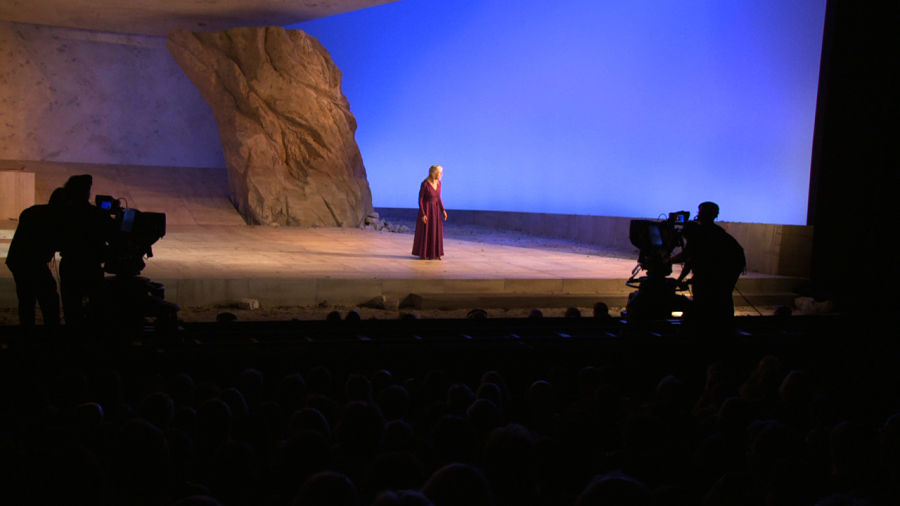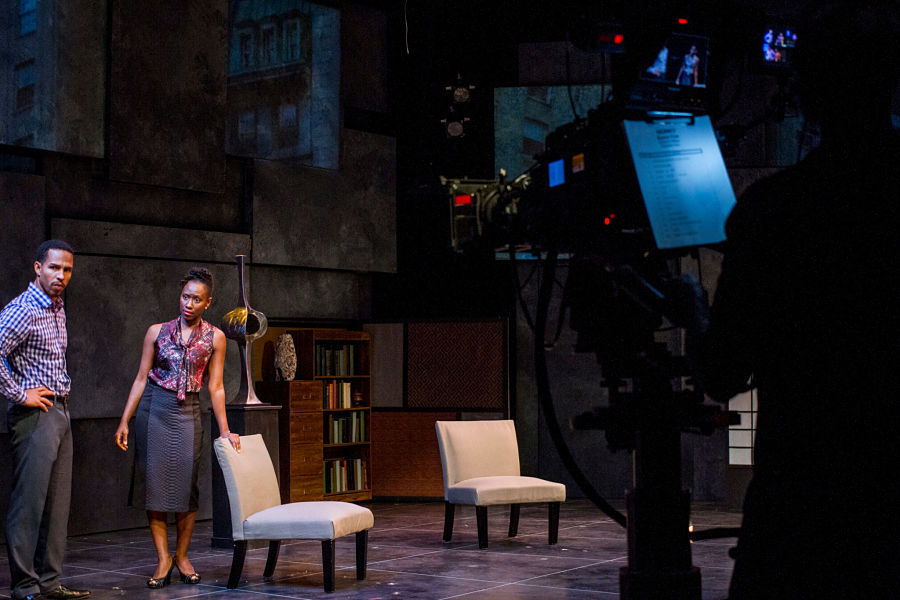It all began when John Fox sat next to John Guare at a gala. The television producer and the playwright got to talking about the dearth of theatre on television, and why that was in a world where technology is constantly advancing.
“It just started this idea in my head,” explains Fox, who serves as an executive producer for “Onstage In America.” The new series aims to nationally broadcast regional productions at nonprofit theatres, and the pilot, a filmed version of San Diego Repertory Theatre’s production of Greg Kallares’s Honky, aired on Friday, Nov. 6 on PBS. The show is still awaiting a series order.
Fox approached his friend and former “Saturday Night Live” colleague Mary Salter with his thoughts, as he knew she had contacts in the theatre industry. Salter was skeptical at first.
“I was less interested in just putting theatre on TV, but I am very interested in not-for-profit, small regional theatres, and I also saw that they were really struggling to survive,” explains Salter. “We’re trying to develop an audience for people to go into theatres and be in a place with real human beings in real time.”
At the time Fox and Salter conceived “Onstage In America,” PBS’s “Great Performances,” which broadcasts occasional Broadway, opera, symphonies, and more, was really the only outlet for stage on the small screen. Now PBS has “Theatre Close-Up,” which films Off-Broadway productions for Channel 13 (WNET). The series launched in Oct. 2014 with John Van Druten’s London Wall from the Mint Theater Company, and broadcast all four plays in Richard Nelson’s Apple family cycle at the Public Theater, Hamish Linklater’s The Vandal at the Flea Theater, Denis O’Hare and Lisa Petersen’s An Illiad at New York Theatre Workshop, and more.
The series’ second season launched on Oct. 1 with Rasheeda Speaking, starring Dianne Wiest and Tonya Pinkins at the New Group. Later this season, the series will show Tom Dugan’s Wiesenthal at the Acorn Theatre on Theatre Row, and Nikkole Salter’s Repairing a Nation from the Crossroads Theatre Company in New Brunswick, N.J.
“We had a meeting with many nonprofit groups and said, ‘If we did this, would you be interested in participating?’ and practically everybody said yes,” says David Horn, executive producer of “Theater Close-Up.”
“Close-Up” is a local broadcast in the tristate area, while “Onstage” aims to be national. But “Close-Up” is exploring filming outside of New York, and has had talks with theatres like New Jersey’s George Street Playhouse and Connecticut’s Westport Country Playhouse. And while the new “Onstage” is regionally oriented, the producers aren’t ruling out shooting a New York production.

For “Close-Up,” Horn says he wants the theatres to come to him with shows they want broadcast, pointing out that there can be roadblocks for shows with commercial aspirations. “Everybody in the theatre world is a bit afraid of television,” Horn says. “They think it’s going to impact the commercial viability.”
Though Salter and Fox say they’ve heard some of the same issues. But rather than have companies come to then, Salter and Fox send scouts to shows across the country and choose projects based on what they’ve seen. This mandate creates a bit of a hurdle, as nonprofit runs are generally just four weeks long. Seeing, greenlighting, and producing a film shoot in that time span can be difficult.
“If we think the play is really interesting, we want a scout there in previews,” explains Fox. “We send these scouts under cover of darkness, because we don’t want to create any anticipation on the part of the theatre company. If something looks really interesting, one of us will go on the next flight out, and if we agree this is it, then we immediately start talking to the theatre company.”
Not every play is right for TV, of course. According to Salter and Fox, there are a few criteria that make a difference. Honky, for instance, appealed because its race-related themes seemed topical. “The characters are not afraid to say what people are usually afraid to say out loud,” explains Honky director and San Diego Rep artistic director Sam Woodhouse. “We chose it because we like to do plays that put the conversation that’s happening in America onstage.”
Salter also adds that pacing is an important consideration, as shows with extended exposition don’t always play as well in the television format; audiences need a dramatic hook early on in order to remain engaged.
“Theatres have been afraid to produce it because it is so relevant and so provocative,” Fox says of Honky, noting that it hasn’t had another production since the one at the Rep in the fall of 2014. “I actually think being on television will encourage production of the play.”
Neither “Close-Up” nor “Onstage” are money-making ventures. Fox and Salter funded the pilot of “Onstage” through Kickstarter, and say they hope, if picked up as a series, the show will be funded by PBS, foundation support, and individual donations.
In order to capture these productions, a film crew comes in and shoots two performances with a live audience, with the cameras weaving around the stage. Audiences for those performances are made aware in advance, and indeed come as much for the event of the filming as for the stage show. For “Close-Up,” Horn says, they pin mics on the actors. Both “Close-Up” and “Onstage” also schedule a filming day without the audience for some close-ups and pick-up shots.
Actors are compensated for their time through an agreement with Actors’ Equity. “Since the Off-Broadway agreements don’t allow for the broadcast of a show in its entirety, Equity issued a media agreement that allows the filming and provides for additional compensation for Equity members,” says AEA national director of communications Maria Somma. “The theatrical producer signs the media agreement, while WNET, which is a signatory to SAG-AFTRA, issues a SAG-AFTRA contract.”

The most successful example of not-for-profit theatre broadcasts is National Theatre Live, which differs from these PBS ventures in two significant ways: Productions are shown in movie theatres and are broadcast live. The series launched in June 2009 and is in its sixth season. NT Live is also unique in that they executive-produce all of their events in house, though they have partnered with BY Experience for distribution to cinemas and performing arts centers around the world.
“Customers love the idea that they’re watching theatre at the same time as audiences across the U.K. and Europe,” explains Julie Borchard-Young of BY Experience, which also works with the Metropolitan Opera, the Stratford Festival, Roundabout Theatre Company, and more. “It’s a shared experience.”
And while these productions’ popularity is often star-driven—Benedict Cumberbatch in Hamlet was one of the latest offerings—Horn believes that public television is the perfect place for nonprofit theatre stateside.
“I’m having a lot of fun doing it,” says Horn, who has also directed all of “Close-Up’s” broadcasts. “There’s so much scripted drama on television, so where is the place for public television? I think it’s theatre.”


